Today, White-bellied Heron was sighted at the Punatshangchhu-II Dam water reservoir. A lone heron, likely of first year juvenile that was fledged in previous year from nearby nesting site was observed.
The sighting is significant as it marks the crucial ecology for herons to adapt the varying conditions of the habitat change.
This water reservoir is gaining popularity both for the waterbirds and the bird watchers in the country. A recent record of Oriental Darter, that is added new record for the country was also observed from the area a fortnight ago. Today, the Oriental Darter was observed to present at the same area.
The community forest in Laja Gewog under Dagana district associates their name to their holy site of Guru Rinpoche that resembles the frontier sky fortress, featuring a religious bell hanging from a cliff and an Urn (Thro), Tha Namkhai Dzong. The community forest group there consist of more than twenty members. In 2022, RSPN supported the community forest to restore their degraded forest of 1 acre with plantation activity. The choice of species include mixed of native trees and high-value timber species that will benefit both the wildlife and the communities.
The team from RSPN recently visited the plantation area and observed good post-plantation care. The growth of trees observed significant progress with 98% survival rate. As a way forward mechanism, team also interacted with the chairman and discussed the possible future collaboration and strengthening the post plantation as mandated by the government.
RSPN, under the IKI project funding is initiating to restore 50Ha of degraded areas within White-bellied Heron landscape with the plantation. The restoration activity is considered to benefit both the wildlife and the communities.
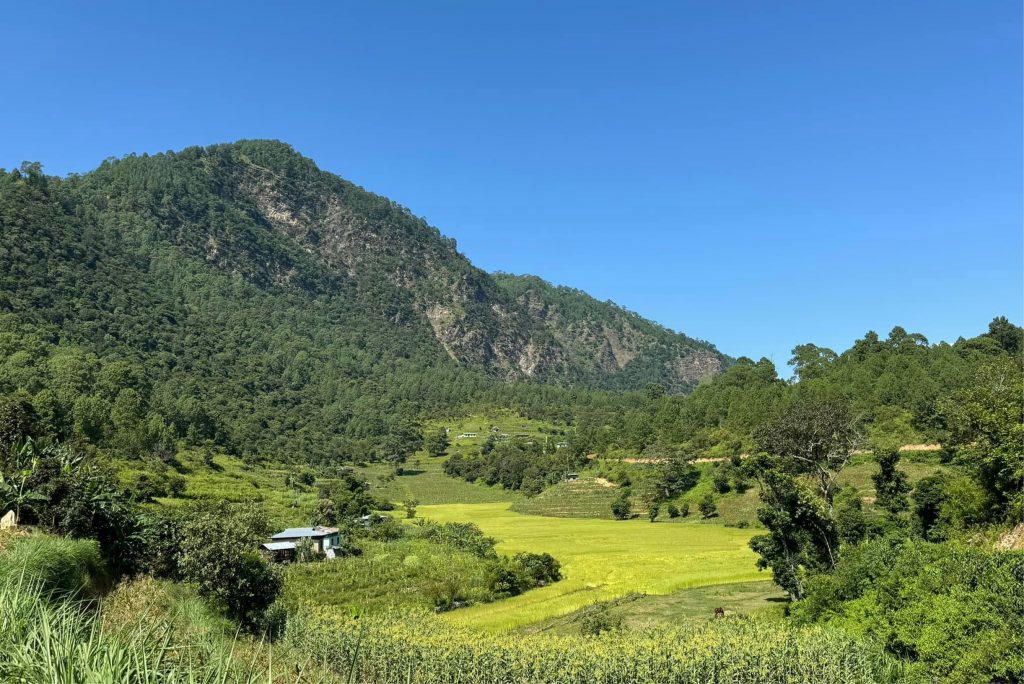
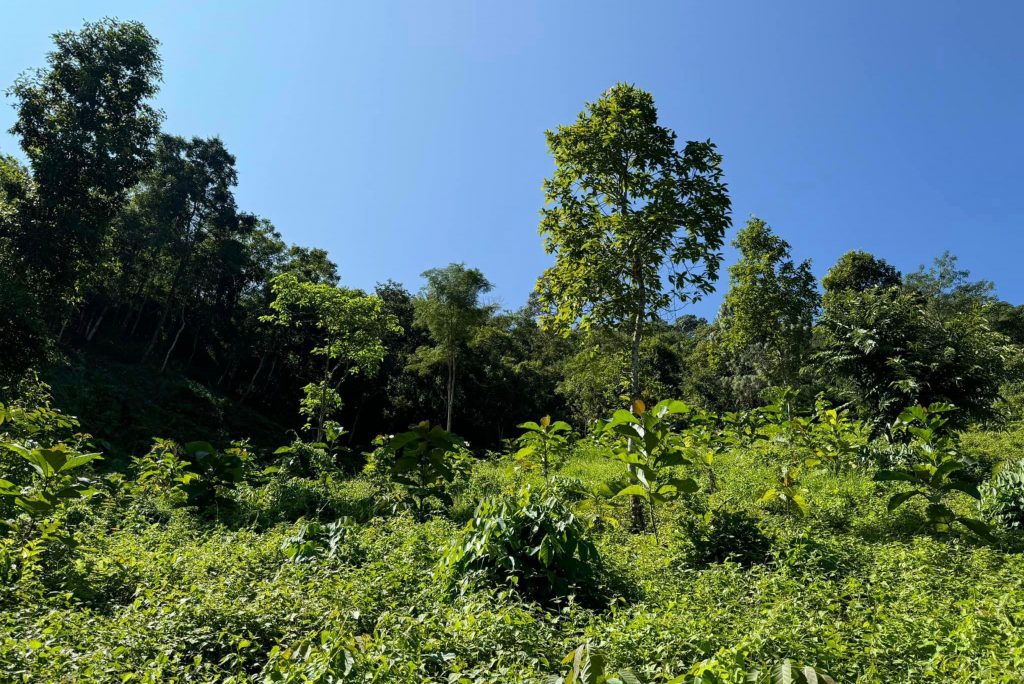
Bhutan has forest coverage of 69.71 per cent with a total carbon sequestration potential of 11 million tonnes of CO2 per annum in the form of above-ground biomass accumulation(NFI, 2023). From this actual coverage, a small, very significant amount of forest is of planted forest. The Kuensel Newspaper issue of 3rd April 2023 reported that Bhutan has embarked on tree plantation since 1951 and by 2012 about 54,782.38 acres of plantation were carried out. If all these trees had survived, it would have been impenetrable in some areas. However, the same paper reported 62.20 per cent of the land planted with trees did not support the plantation, the trees either died or could not be traced.
There are various factors leading to the failure of the plantation, improper plan, lack of post plantation care, occurrence of development activities, poor seedling quality, harsh climatic conditions, mismatch of tree species and the area, and occurrence of natural disasters such as landslides, floods, and forest fires. Some even feel that due to poor technical skills and knowledge earlier, there are cases of wrong species being introduced to the area that led to a series of problems from drying water sources to issues of driving native species. Ultimately failure of plantation activity. It raises the concern of having basic knowledge and skills in raising plant nurseries and planting trees. The wrong in these processes will put significant risk to the whole ecology of the forest. To overcome such gaps mainly building the capacity of local communities, the two-day capacity-building workshop is currently underway in Tsirang.
The Royal Society for Protection of Nature(RSPN) in collaboration with the Tsirang Forest Divisional Office under the Department of Forest and Park Service(DoFPS) is conducting the workshop to build the skills and knowledge on establishing the nurseries and carrying out plantation activities. The workshop recognizes both indigenous and scientific knowledge of the nursery and plantation process. This workshop will significantly uplift the capacity of local communities and relevant stakeholders in sustaining the nurseries and plantations they have owned, and also venturing into new initiatives with a fresh outlook.
The workshop is delivered through theoretical presentation and practical demonstration. Some of the specific session outlines are the importance of having the right skills and knowledge; nursery establishment process; carrying out the plantation process; journaling, innovation, and post-plantation care that all drive towards success.
The participants attending this workshop are from diverse backgrounds representing different communities under Tsirang Dzongkhag. Many of them represent community forest and community-based nursery groups. The participants also include youths and teachers serving in the community. Their participation, especially of teachers will be important back at school in teaching the students on such subject matter and disseminating it in the communities. Overall, this workshop will contribute to boosting the economic condition of the community and also managing the biodiversity.
The workshop will end with free takeaways of nursery sapling gifts of preferred plant species choices by the participants and expected to plant the hope for a new beginning; some see it as business, some think it as a means to sustain the Indigenous crops, some feels they can enrich the biodiversity, some see as teaching material and for many, they see it is a future that has ecological, cultural, provisional and economic values.
𝗖𝗼𝗺𝗺𝘂𝗻𝗶𝘁𝘆-𝗯𝗮𝘀𝗲𝗱 𝗡𝘂𝗿𝘀𝗲𝗿𝘆 𝗘𝘀𝘁𝗮𝗯𝗹𝗶𝘀𝗵𝗺𝗲𝗻𝘁.
In the years 2021 and 2022, RSPN supported seven nursery sites in different communities of six districts. Based on a proposal received to establish the nursery by the communities, the RSPN through the International Climate Initiative(IKI) project supported the establishment of these nurseries. The nursery establishment priority was provided to communities with low income, women groups, and people being affected by COVID-19 pandemic the most, and based on feasibility and recommendations received from respective Divisional Forest Office in the project area.
To make the nursery establishment effective and successful, an agreement was drawn and agreed between RSPN and the respective nursery community groups. The agreement includes a buyback mechanism of tree saplings produced from the nurseries to support the plantation activity within the degraded habitats of White-bellied Heron(WBH). The type of tree saplings to be raised by the respective nurseries was also discussed and agreed. Nursery groups were encouraged to raise more native trees that are economically viable to the community and have ecological significance.
The provision to take up the nursery establishment by the community helped in building the capacity of the community to raise the nursery and also identifying as a means of entrepreneurship opportunities through it.
𝗣𝗹𝗮𝗻𝘁𝗮𝘁𝗶𝗼𝗻 𝘀𝘂𝗽𝗽𝗼𝗿𝘁.
Under the same project, IKI, RSPN targets to restore 50 hectares of degraded landscape of WBH with annually restoring 12.5 hectares. The Ecosystem and Socio-Economic Resilience Analysis Mapping (ESRAM) study was carried out in WBH landscape to identify some of the degraded areas that need restoration. Based on the ESRAM study, nine Gewogs from 31 Gewogs surveyed have been assessed as ‘highly vulnerable’, 15 Gewogs were assessed as ‘vulnerable’ while 7 Gewogs are categorized as ‘less vulnerable’. Ten sites were then selected for the intervention activity mainly to restore the degraded habitats of WBH through the plantation.
For the last three years, RSPN has brought close to 40 hectares of land under restoration through plantation. The plantation program includes afforestation in degraded lands, forest enrichment support to community forest groups and commercial plantation in private lands that are not feasible for crop cultivation. The choice of tree species supported is mostly of native tree species. A mutual agreement was also made between RSPN and beneficiaries that the plantation should consist of mixed tree species that have both ecological and economic values; plantation of commercial high-value tree species to benefit the communities; and plantation of wild fruiting trees that will benefit wildlife. This in the long run also targets to mitigate Human-Wildlife conflict.

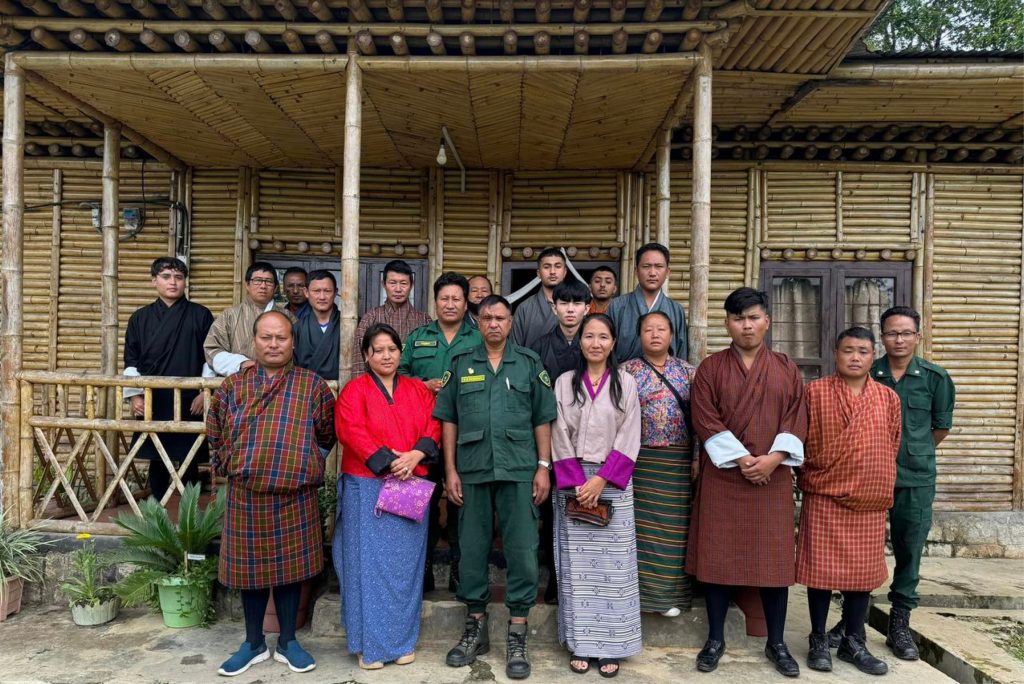

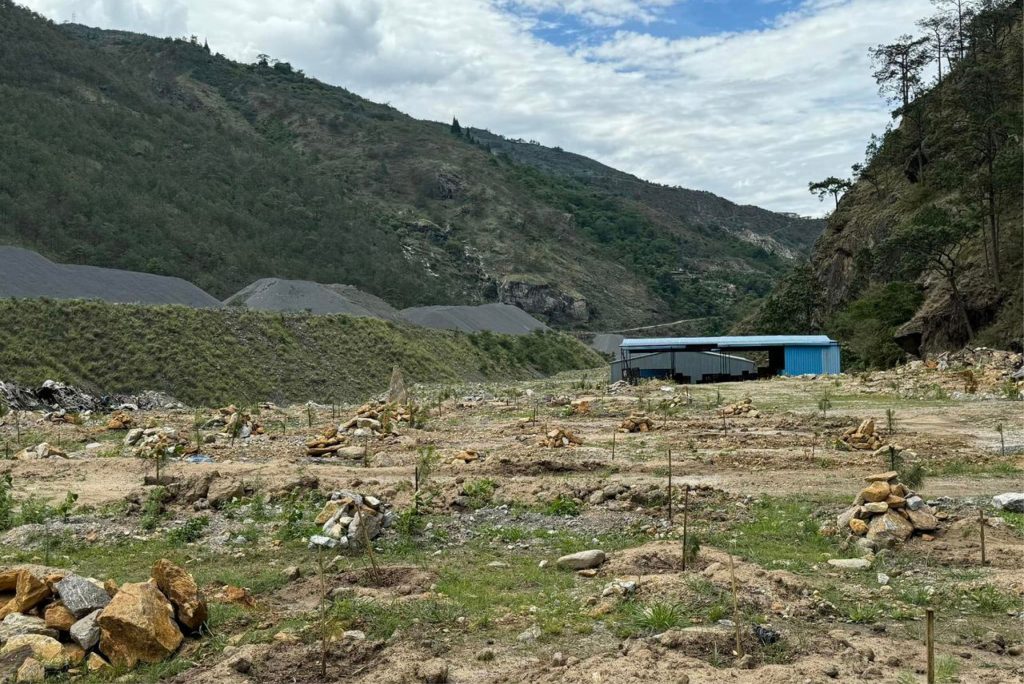
𝗣𝗿𝗼𝗷𝗲𝗰𝘁 𝗦𝗰𝗼𝗽𝗶𝗻𝗴 𝗠𝗶𝘀𝘀𝗶𝗼𝗻 𝗶𝗻 𝗪𝗵𝗶𝘁𝗲-𝗯𝗲𝗹𝗹𝗶𝗲𝗱 𝗛𝗲𝗿𝗼𝗻 𝗹𝗮𝗻𝗱𝘀𝗰𝗮𝗽𝗲.
RSPN Bhutan in partnership with supporters from Japan and the Athang Institute, is currently conducting a comprehensive project scoping study within the White-bellied Heron landscape. The primary objectives of this study include delineating the project boundary, conducting an assessment of community needs and available natural capital, evaluating the technical, economic, and logistical feasibility of the project, and assessing the capacity of institutions and communities to implement and sustain the project. The joint team comprises experts with diverse backgrounds in conservation, ecotourism, climate change, and environmental education.
This scoping study holds significant importance within the project design framework of the Royal Society for Protection of Nature, aligning with existing Environmental and Social safeguards policies. With over three decades of experience in implementing conservation and community projects, RSPN has positively impacted numerous communities through the establishment of sustainable development activities. Rigorous evaluation under the robust safeguard systems of RSPN ensures that projects are well defined, feasible, and effective.
Building upon the information gathered from this scoping study, further review and situation analysis will be conducted to progress towards developing a comprehensive proposal. RSPN aims to innovate this project by integrating a private partnership model encompassing conservation efforts, sustainable livelihood activities, climate change initiatives, and other thematic areas.
White-bellied Heron and the Communities
WBH is critically endangered in the verge of extinction. It is found distributed only in freshwater river of Himalaya. The current distribution is restricted to only three South Asian countries, Bhutan, Northeast India and Myanmar with estimated population of less than 60 individuals. Given its critical status, the preservation of the White-bellied Heron holds paramount importance.
The habitats of the White-bellied Heron are also home to numerous remotely located communities that rely on shared resources. Therefore, garnering community support is imperative.
A community-driven conservation project within the White-bellied Heron landscape is not only feasible but also essential for the preservation of this species and the sustainability of the surrounding ecosystems.
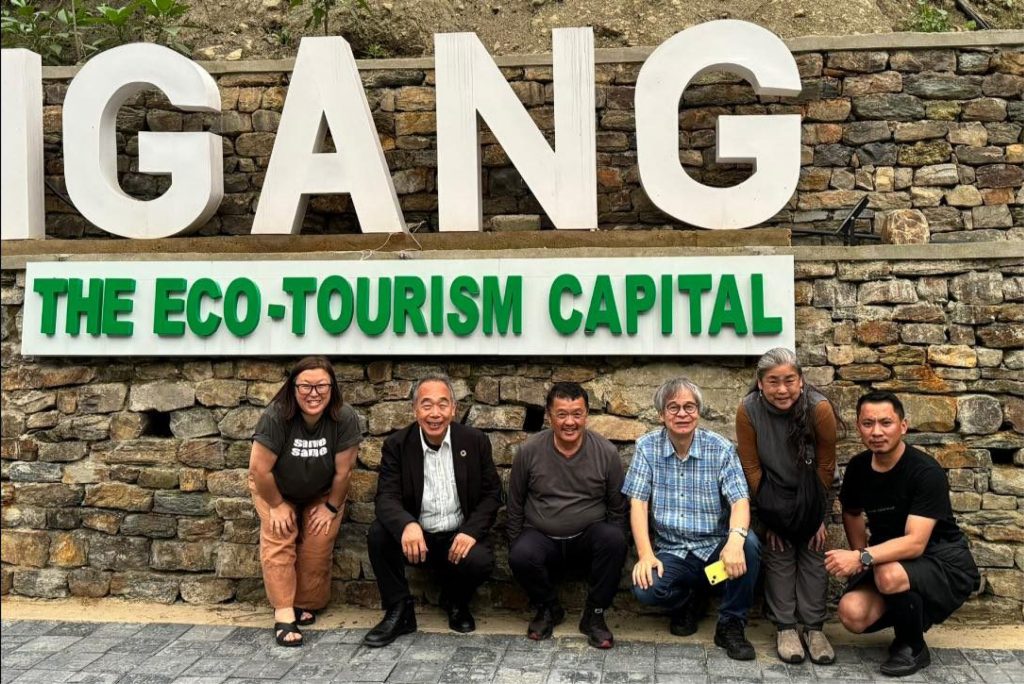
An annual population survey of White-bellied Heron(WBH) this year observed the presence of 𝟮𝟱 individuals of WBH in Bhutan, including three herons that are currently being raised at the White-bellied Heron Conservation Center.
For the year 2024, the survey was conducted from 1st to 5th March across the major river basins in Bhutan; Wangchhu, Punatshangchu,
Mangdichhu, Kuri-gongri, and Jomori. These major rivers with its tributaries are identified as either currently occupying populations or known as potential habitats of WBH.
The WBH population survey was first initiated 2003 and it is an ongoing annual event coordinated by the RSPN with the support of DoFPS and LCSG members in conducting the survey. This concerted effort is significant for the WBH conservation. Today, WBH conservation is not only as a flagship program but also as a fundamental aspect of RSPN’s core mandate aimed at securing the species’ genetic diversity and facilitating population recovery in Bhutan and the region.
The annual nationwide population count enlisted the efforts of more than eighty surveyors from the Department of Forests and Park Services(DoFPS), Local Conservation Support Groups (LCSG) and the staff of Royal Society for Protection of Nature (RSPN).
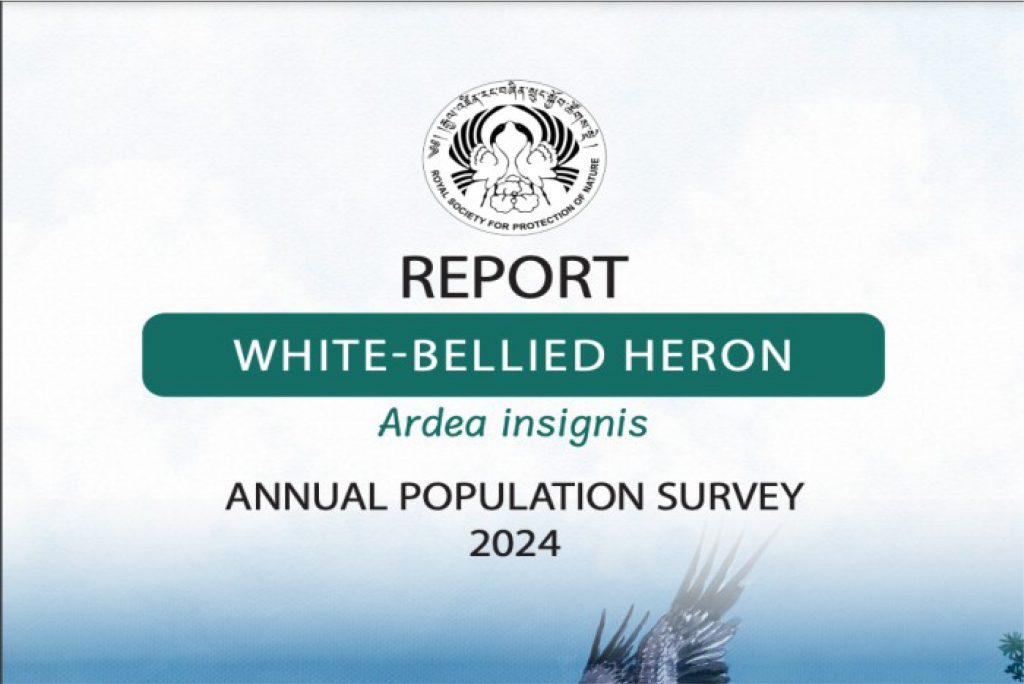
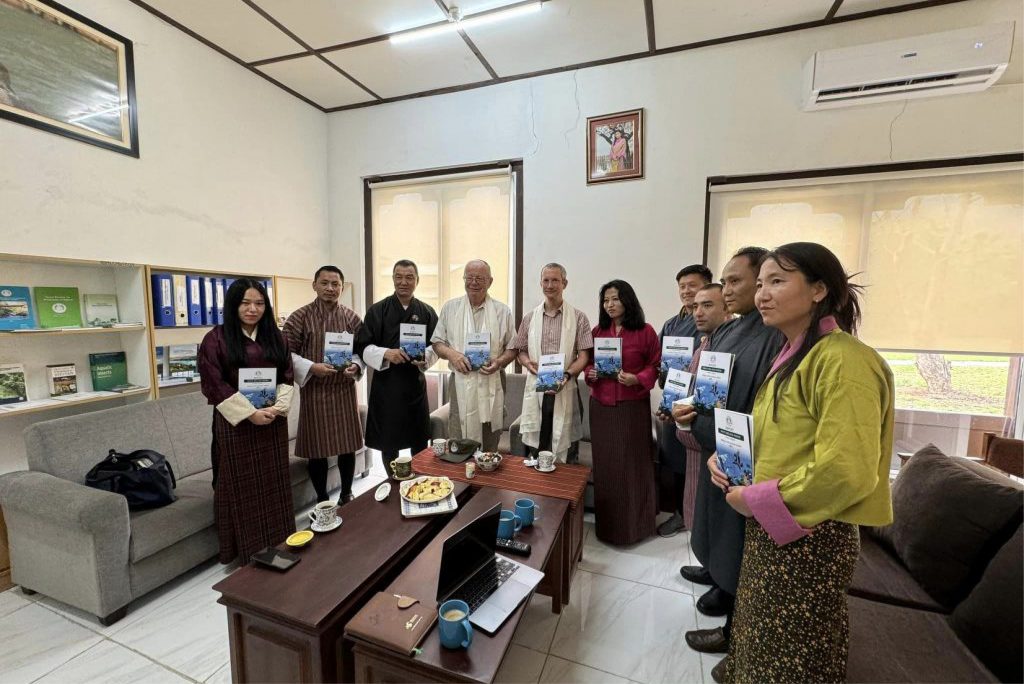
The delegation from the German Federal Ministry for Environment, Nature Conservation, Nuclear Safety and Consumer Protection (BMUV) was in Bhutan. The five member team was led by Dr Christiane Paulus, Director General, Nature Conservation, Sustainable Use of Nature Conservation, Sustainable Use of Natural Resources, Nature-based Climate Action.
On 25th April, 2024 the delegation visited the RSPN ‘s project site for the ongoing BMUV-IKI project ‘Developing Ecosystem-based Solutions for Managing Biodiversity Landscape in Bhutan In WangduePhodrang District from restoring White-bellied Heron habitats to inaugurating Rural Water Supply Schemes (RWSS).During their visit, the team actively engaged in observing the ongoing restoration efforts for the White-bellied Heron habitat at the PHPA-I site. Additionally, the team also visited the RWSS support in Matalungchhu Chiwog.
As a symbolic gesture, the team planted tree saplings at the PHPA-I site, marking the commencement of collaborative restoration activities with PHPA-I. This year, the restoration targets encompass 8 hectares of degraded areas within the PHPA-1 Project site, a vital habitat for White-bellied Herons.
Later in the day, the team participated in the inauguration of the completed RWSS initiative which was implemented in partnership with Thedtsho Gewog under the Wangdue Phodrang administration. This intervention will positively impact the three villages comprising 25 households, one community Lhakhang and benefit the 26 students of the Extended Classroom School.
The RSPN would like to express our profound gratitude to the delegation team for their invaluable visit to the field sites, highlighting the collective commitment towards preserving Bhutan’s unique natural heritage and environment.




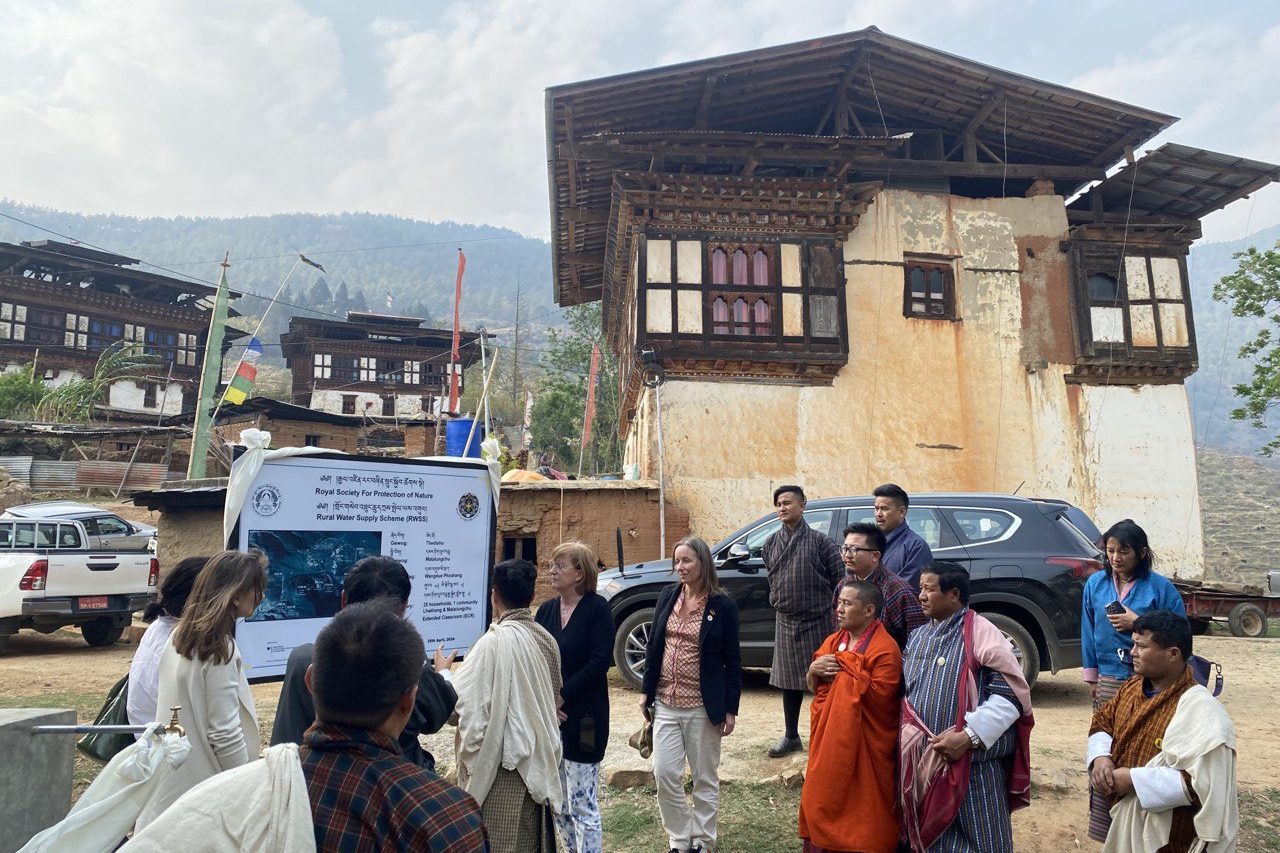

In an effort to monitor and conserve the Critically Endangered #WhitebelliedHeron (Ardea insignis), RSPN Bhutan in collaboration with Department of Forests and Park Services is set to conduct its Annual Population Survey from March 1st to March 5th, 2024.
This comprehensive survey aims to provide crucial insights into the current status of the White-bellied Heron population (#WBH), aiding in informed conservation strategies for this rare and iconic species. Recognizing the critical need for conservation efforts, RSPN has undertaken yearly surveys since 2003 to evaluate population patterns, geographical spread, and possible risks to the heron.
This year’s survey will cover key habitats and breeding grounds across Bhutan. A team of experienced conservationists and field researchers from DoFPs and RSPN along with Local Conservation Support Group ( #LCSG) members will conduct five consecutive days of surveying along the major river basins and tributaries of Bhutan to obtain accurate and comprehensive data on the White-bellied Heron population dynamics. During the survey, the surveyors will also document other waterbirds and wildlife found along the river basins of Bhutan.
Since this Survey is a significant undertaking that requires collaboration from various stakeholders, we encourages all to join hands with us in our mission to safeguard the White-bellied Heron and its ecosystem. Anyone who happens to spot the White-bellied Heron during the survey period, kindly report it to RSPN by emailing to us at rspn@rspnbhutan.org.
𝗙𝗮𝗰𝘁𝘀 𝗮𝗯𝗼𝘂𝘁 𝗪𝗵𝗶𝘁𝗲-𝗯𝗲𝗹𝗹𝗶𝗲𝗱 𝗛𝗲𝗿𝗼𝗻:
![]() Listed as Critically Endangered by the International Union for Conservation of Nature (IUCN).
Listed as Critically Endangered by the International Union for Conservation of Nature (IUCN).
![]() With fewer than 60 WBH individuals remaining in the world
With fewer than 60 WBH individuals remaining in the world
![]() Found only in three range countries of Southeast Asia, Bhutan, Northeast India and Myanmar.
Found only in three range countries of Southeast Asia, Bhutan, Northeast India and Myanmar.
We are delighted to receive two gentlemen from Thimphu City FC (TCFC), Mr. Hishey Tshering and Mr. Orgyen Wangchuk Tshering, with a gift from the club to our 𝗪𝗵𝗶𝘁𝗲-𝗯𝗲𝗹𝗹𝗶𝗲𝗱 𝗛𝗲𝗿𝗼𝗻 𝗖𝗼𝗻𝘀𝗲𝗿𝘃𝗮𝘁𝗶𝗼𝗻 𝗽𝗿𝗼𝗴𝗿𝗮𝗺.
It’s truly heartening to witness the intersection of sportsmanship and conservation through the generous initiative undertaken by Thimphu City Football Club (TCFC). The decision of TCFC to pledge a contribution for each goal scored in the last season of the BOB Bhutan Premier League exemplifies a remarkable fusion of athletic prowess and environmental stewardship. By channeling their success on the field into support for the White-bellied Heron Conservation program, TCFC has showcased a profound commitment to making a positive impact beyond the realm of sports.
We extend our deepest gratitude to TCFC, particularly Mr. Hishey Tshering, for their unwavering support of our conservation efforts. Their generosity not only provides vital financial assistance but also amplifies awareness about the importance of preserving the natural heritage of Bhutan. Such collaborations between sports organizations and conservation programs underscore the collective responsibility we share in safeguarding our environment for future generations.
RSPN has been implementing projects related to climate change, conservation, and livelihood that have several components on plantation activity. To enhance the impact of the project outcome, today the Green Bhutan Corporation Limited (#GBCL) and RSPN Bhutan signed a 𝗠𝗲𝗺𝗼𝗿𝗮𝗻𝗱𝘂𝗺 𝗼𝗳 𝗨𝗻𝗱𝗲𝗿𝘀𝘁𝗮𝗻𝗱𝗶𝗻𝗴, a joint partnership for carrying out the Plantation and production of seedlings. RSPN will henceforth rely on the expertise of GBCL to implement activities related to the plantation.
The means to restore degraded habitats of wildlife, improve socio-economic condition of the people or mitigate climate change, the reforestation or afforestation through the plantation is a significant mechanism.
#GBCL, a corporation duly established under Bhutan’s laws, is registered as State-owned company. GBCL specializes in various services related to floriculture, establishment of nurseries and seedling production, plantation and its maintenance, establishment and management of recreational parks, landscape development, and greening to improve aesthetics and ensure security for inhabitants in Bhutan.
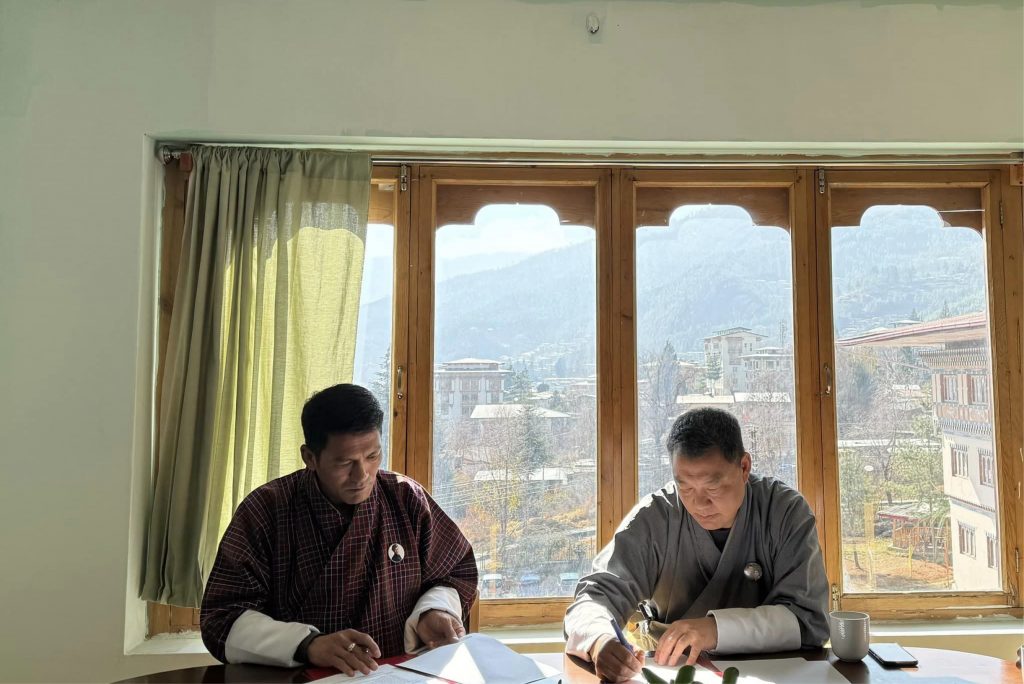
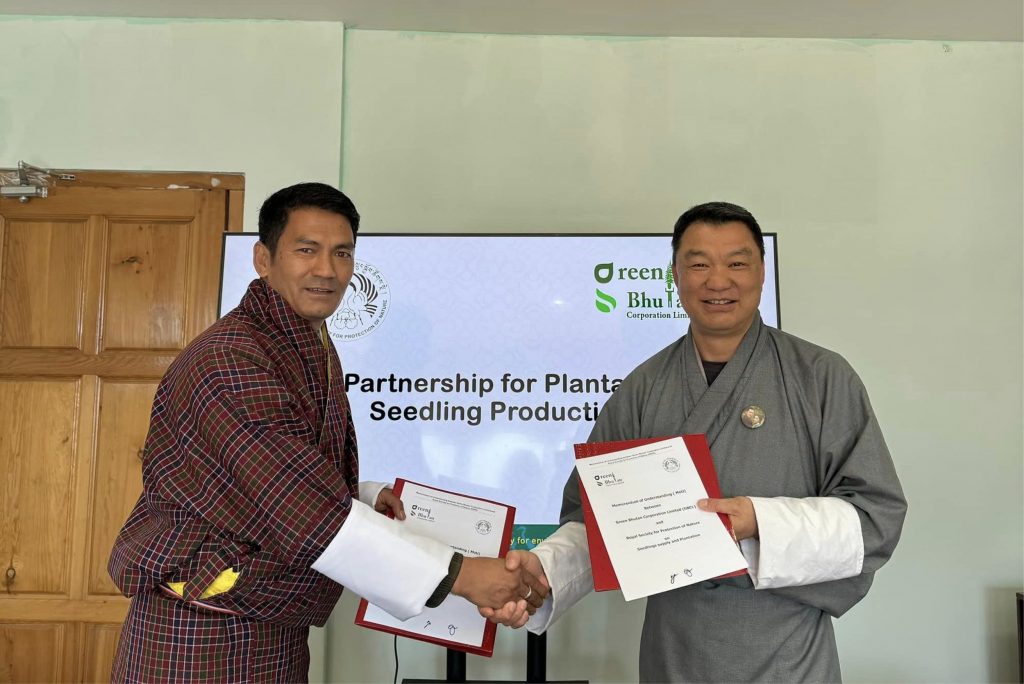
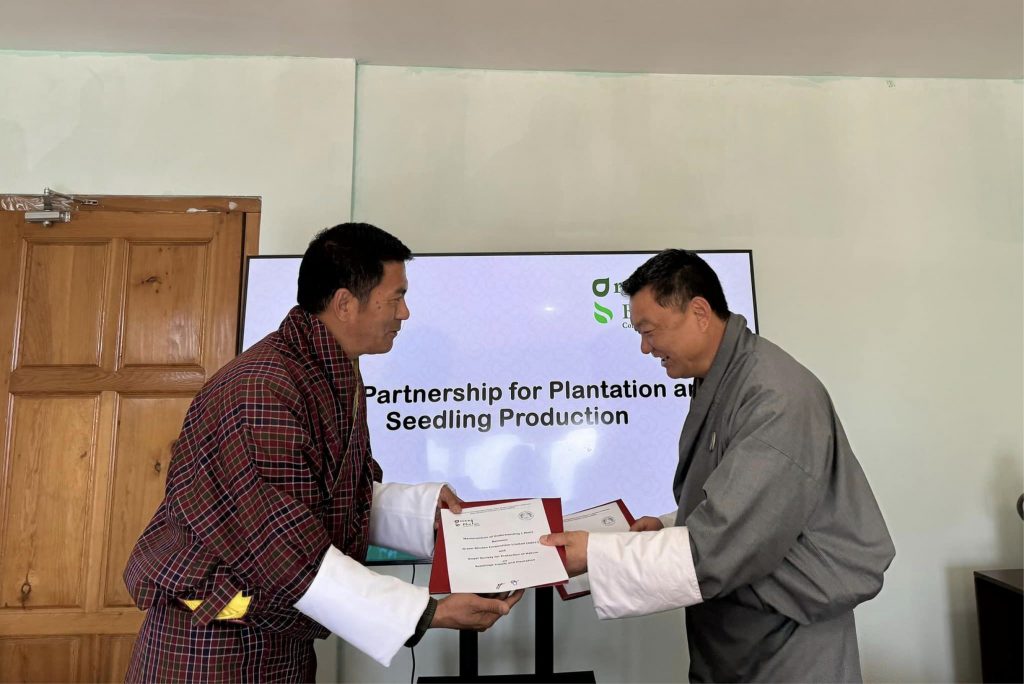
Copyright © 2026 RSPN All Rights Reserved